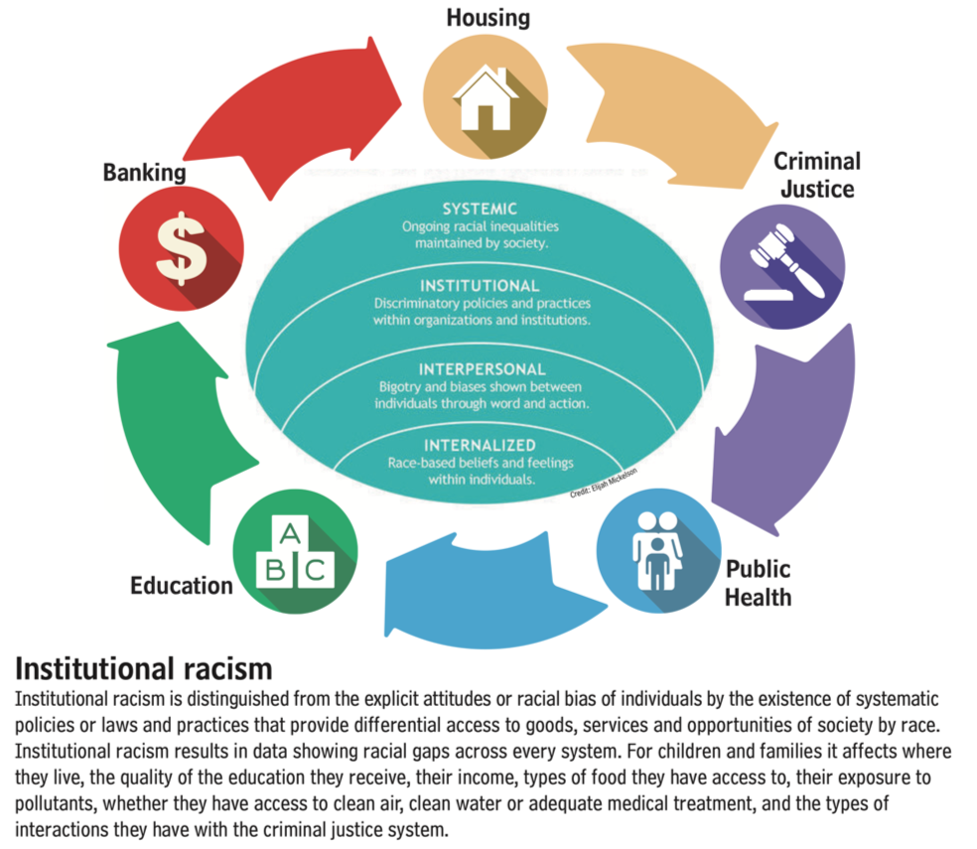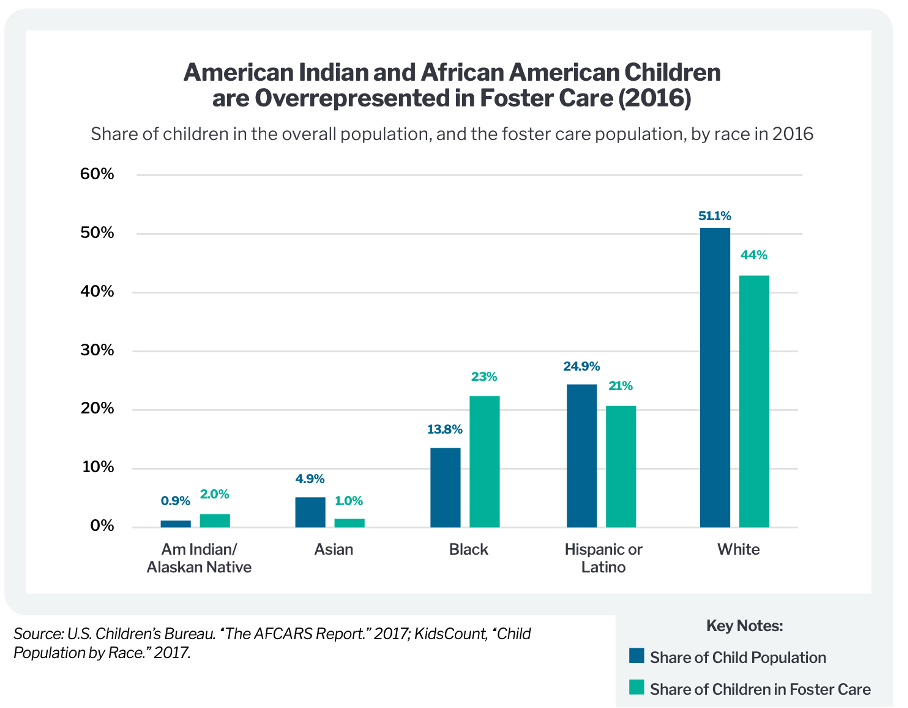Our team had the opportunity to talk with North Carolina’s district court judges about race, ethnicity, and child development. In this post, we share our approach to this important conversation. We used Dr. Joia Crear-Perry’s* re-framing, “race isn‘t a risk factor, racism is” as the lens for our discussion. Our first step was to describe the levels of racism and the impact racism has on children by tracing the trajectory of two children’s lives, one Black and one white, through our institutions, using this infographic developed by the Frank Porter Graham Child Development Institute’s RACE Committee.
Next, we focused on institutional racism, the discriminatory policies and practices that exist within all organizations and institutions. Institutional racism crosses all institutions and is systemic. For children and families, it impacts where they live, the quality of education they receive, income, access to food, exposure to pollutants, access to health care, and interactions with the justice system.

Using the story from the infographic, we discussed how racial inequity can be seen as early as preschool through discipline practices. For example, Black students, especially boys are disproportionately more likely than their white peers to face multiple suspensions from preschool. Almost 50% of preschool children suspended more than once are Black (Justice Policy Institute, 2020). As children get older, Black students are four times as likely to be suspended than their white peers (MomsRising, n.d.). In fact, research shows that one of the most significant predictors of suspension is not the type of offense but the color of the child’s skin (MomsRising, n.d.). The impact of suspensions on a child’s wellbeing is well documented. Suspensions reduce the opportunities for instruction and for developing the skills needed for school success (Nelson, 2015). They also contribute to lifelong health, well-being, and economic disparities (Nelson, 2015).
Racial inequality not only impacts a child’s well-being in school, it also infiltrates the family’s well-being, as illustrated through Jamal’s story. The child welfare system disproportionately impacts Black and Native children and their families. This is clearly demonstrated through their over-representation in the child welfare system (see chart below); which means that children of color are significantly more likely to be separated from their families (Minoff, 2018).

The over-representation of Black families in the child welfare system is a direct result of institutional racism and it has led to the criminalization of Black mothers and the dismissal of Black fathers. Similarly, the legacy of colonialism has harmed Native communities by removing children from their homes and families under the guise of assimilation into white culture.
Foster care can have many negative effects on children, including experiencing trauma from failed or unsafe placements, moving multiple times, and the loss of connections through these changes. Experiencing foster care also increases a child’s risk for negative outcomes like low educational attainment, homelessness, unemployment, economic hardship, mental health disorders and criminal legal system involvement (American Academy of Pediatrics, 2000).
We then presented information on the upEND movement – a 2020 approach working to create a society in which forcible separation of children is no longer acceptable. Members work to reimagine the current structures and replace them with new anti-racist means of keeping children protected and safe in their homes and communities. The movement is focused on building social and economic supports for families, along with prevention and care so that families and communities are the first responders to crises rather than state intervention. The upEND movement supports anti-racist policies and practices, joining with organizers in other systems who are working for adequate, safe, affordable housing, a guaranteed minimum income, paid sick leave, affordable and high-quality child care, and quality and accessible public education and health care. Family separations should be rare, and their harm to children should be mitigated in the extremely unusual circumstances when they are necessary (Minoff, 2018).
While judges have an important role, there are steps we can all take to dismantle institutional racism. First, we must become aware of our own biases through education and self-reflection. Then, we must raise consciousness among others by challenging racist comments and other microaggression, speaking out against instances of white supremacy in our institutions, and seeking and embracing diversity among practitioners. And lastly, we must develop a racial equity lens – “a way of thinking about, reflecting upon, and paying attention to the way that race, racism and white supremacy interact with power in a situation or event; it is an understanding that race is ever present” (Ronda Taylor Bullock, PhD, Director, we are).
*Dr. Joia Crear-Perry is the Director of the National Birth Equity Collaborative
References
Justice Policy Institute. (July 2020). The Presence of School Resource Officers (SROs) in American Schools. http://www.justicepolicy.org/uploads/justicepolicy/documents/School_Resource_Officers_2020.pdf
Minoff, E. (2018). Entangled Roots: The Role of Race in Policies that Separate Families. Center for the Study of Social Policy. https://cssp.org/wp-content/uploads/2018/11/CSSP-Entangled-Roots.pdf.
MomsRising. (n.d.). Facts about the School- to-Prison Pipeline. https://www.momsrising.org/campaigns/school-to-prison-pipeline/facts
Nelson, L. and Lind, D. (2015). The school to prison pipeline, explained. Justice Policy Institute. http://www.justicepolicy.org/news/8775
Committee on Early Childhood, Adoption and Dependent Care. (2000). Developmental Issues for Young Children in Foster Care. Pediatrics, 106 (5) 1145-1150; DOI: https://doi.org/10.1542/peds.106.5.1145
States News Service. (September 17, 2020). On the road to abolition: The upEND Movement releases three new resources to help reimagine the child welfare system. States News Service. https://advance-lexis-com.libproxy.lib.unc.edu/api/document?collection=news&id=urn:contentItem:60W0-DX51-JCBF-S468-00000-00&context=1516831.

